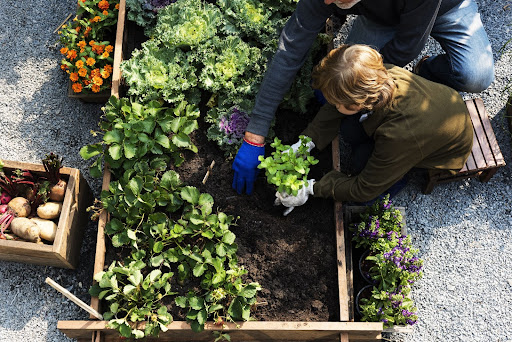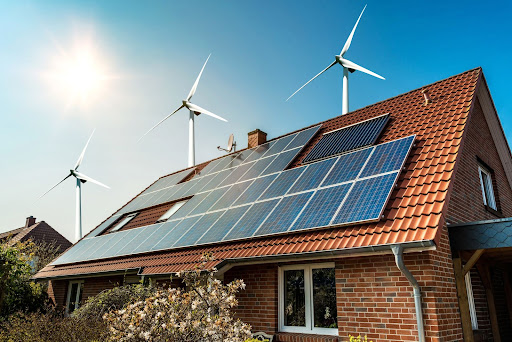Are you looking for ways to make your home more environmentally friendly? Lucky for you, creating a sustainable residence isn’t too complicated. There are tons of simple changes to reduce your household’s carbon footprint. In this article, we’ll explore seven practical but effective ways to make your house eco-friendlier this year.
Recycle and compost
Most cities across America have some form of garbage protocol. Hopefully, your city asks that you separate your recyclable materials from your disposables, which is a good start. Check out the recycling guidelines in your area to ensure you’re correctly disposing of your waste in the correct bins. If you want to take it a step further, consider adding composting to your routine. Composting is the recycling of organic matter like food scraps and leaves and coverts them into compost. Compost is fantastic for your garden because it provides nutrients to your plants and soil. You can add the compost mix to your indoor or outdoor plants, vegetable gardens, and lawns for healthier plants.
Reduce your plastics
Plastic waste makes up a significant part of pollution. Plastic can take 500 years to break down, showing how important it is to start reducing single-use plastics. Luckily, most of the plastic we use in our homes has a better alternative. Ditch your plastic bags and opt for reusable options like tote bags or beeswax wraps to cover your food and buy groceries. If your household goes through a ton of plastic water bottles, switch to a reusable thermos and get a water filter to keep in your fridge or install a water filtering system. You can also buy your foods in bulk to help limit the plastic waste from packaging.
Conserve water
Water is a natural resource the world is in a limited supply of. If you want to make eco-friendly improvements to your home, reducing your water usage is a necessary place to start. If you have leaks around your home, fix them as soon as possible to conserve water. You can also install low-flow plumbing fixtures to reduce the water these systems use. If you take long showers, you’re wasting water and should start setting a timer to help limit your water use. In addition to shorter showers, try to run full loads of laundry or dishes to maximize your water usage. If you want to be a sustainable superstar, you can collect rainwater or use the water from your washing machine and use it to water your garden.
Switch to clean energy
Using clean energy plays a vital role in the fight against climate change. Luckily, depending on where you live, there are likely a few clean energy plan options for you to enroll in if you can’t install it in your home. For cleaner energy, you can source power from the sun through solar panels, water through hydropower, or wind through wind power. If you live near a large river, you can source your water using that energy. While solar power is the more prevalent clean energy source, many others exist. Clean energy is better for the climate and your wallet because it lowers your electric bill.
Use natural products
Many companies offer sustainable alternatives to products we use in our daily lives. These products are better for the environment and our bodies because of their organically derived ingredients. For example, traditionally, perfumes often use formaldehyde as a preservative, which is destructive to the environment and our bodies. A sustainable alternative avoids these kinds of ingredients. You can find sustainable products and options for almost anything, from perfume, alcohol, meats, and more.
Another noteworthy switch to make is with cleaning products. Cleaning products often use harsh chemicals with damaging health and environmental effects. Natural cleaning products are just as effective as chemically-based cleaning products but use non-toxic ingredients that cause less harm to the environment. Because traditional cleaning products emit harmful chemicals into the air they contribute to air pollution. Natural cleaning products don’t release harmful emissions and instead are biodegradable. These ingredients easily break down and are less likely to cause harm to natural habitats and ecosystems, preventing water and air pollution. Using natural cleaning products in your home reduces your environmental impact.
Ditch the grass and plant a garden

Grass lawns are popular in America but require many resources to keep them alive. A grass lawn uses a significant amount of water to maintain, even more so during the warmer seasons. Water consumption to upkeep grass strains local water resources and exacerbates droughts. Some cities employ water usage limits and ticket individuals who overuse the water supply, which means you’re hurting the environment and your wallet.
Grass lawns also require pesticides and fertilizers to keep them healthy because the grass isn’t a native plant to most areas. These chemicals run off into waterways and pollute the local water supply, potentially damaging aquatic environments. Grass lawns also serve in habitat destruction. Installing a lawn destroys natural habitats, resulting in a loss of biodiversity.
Instead of installing a high-maintenance, expensive lawn in your backyard, opt for a garden. Gardens positively impact the environment by improving air and water quality by absorbing excess CO2. They also provide natural habitats to wildlife and reduce the urban heat island effect. Gardens also are a sustainable resource for food, reducing the need for industrial agriculture. Overall, gardens can significantly make your home greener and more eco-friendly. If you like the look and feel of a grass lawn, you can opt for a clover lawn for a sustainable alternative.
Opt for a clothesline
Instead of wasting electricity using a dryer for your clothes, consider switching to a clothesline. Harnessing the power of air to dry your clothes may take longer, but reduces your environmental impact. Electricity burns fossil fuels to provide energy, resulting in increased greenhouse gas emissions and air pollution. In addition to being better for the environment, drying your clothes naturally can prolong the life of your clothes and linens because it’s gentler on fabrics. Clotheslines are a low-cost, low-maintenance alternative to electric clothes dryers. It may seem primitive, but the benefits for your clothes and the environment are worth it.
A greener home = greener planet
In conclusion, making your home more eco-friendly doesn’t have to be hard on your wallet or damaging to your lifestyle. Starting with simple steps like conserving water and switching to natural cleaning products can influence and motivate you to make more significant changes. Remember, every effort counts, so how will you make your home greener this year?
Megan Isola
Megan Isola holds a Bachelor of Science in Hospitality and a minor in Business Marketing from Cal State University Chico. She enjoys going to concerts, trying new restaurants, and hanging out with friends.


